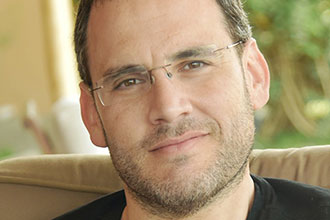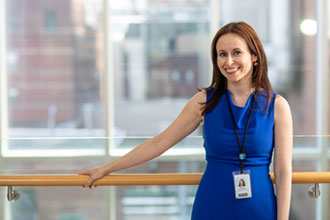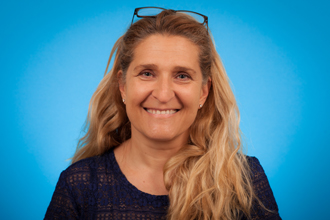Collaboration between the Research Biobank and scientists at St. Michael’s enables COVID-19 research for decades to come

By Maria Sarrouh

Dr. Uriel Trahtemberg
Back in March, Dr. Uriel Trahtemberg, a clinical fellow at St. Michael’s, was on the brink of launching a study about predicting complications from strokes in the Trauma and Neurosurgery Intensive Care Unit. When the COVID-19 pandemic halted the project, Dr. Trahtemberg suggested using existing infrastructure to research COVID-19 instead.
With the help of the Research Biobank at St. Michael’s, the Coronavirus Longitudinal Biomarkers in Lung Injury (COLOBILI) Study was up and running in two weeks, even managing to recruit the first COVID-19 patient to be admitted to St. Michael’s ICU.
“If we were to start from scratch it would have taken months to get it started,” Dr. Trahtemberg said. “Thanks to everyone’s goodwill, hard work and flexibility we were able to set up protocols and access facilities and equipment very quickly.”

Dr. Valeria Di Giovanni
The COLOBILI study is a longitudinal study of biomarkers among COVID-19 patients with lung injury. Blood samples from patients with COVID-19 are collected at various time points so that researchers can track the trajectory of the illness. The multi-omic approach – an analysis in which data sets are made up of multiple “omes”, like genomes, proteomes, transcriptomes and others – means the study will provide insights into the development of COVID-19 across various biological disciplines and domains.
“We’re not cutting the cake in one slice, we’re cutting it in many slices. By looking at these many slices, we can identify different subgroups of patients who have different responses,” Dr. Trahtemberg said.

Dr. Andrew Baker
Securing funding for the study in such short notice was not easy, but principal investigators Drs. Andrew Baker and Claudia Dos Santos played a big role in getting the COLOBILI trial off the ground. Dr. Baker supported the launch of the study until St. Michael’s Foundation provided a grant in June. Dr. Dos Santos secured infrastructure support for the bio-banking portion of the study through the Canada Foundation for Innovation’s Exceptional Opportunities Fund. The fund is supporting the creation of a dedicated COVID-19 biobank at the University of Toronto.
Almost every patient with COVID-19 who has passed through St. Michael’s ICU has participated in the study, representing a very high recruitment rate and hundreds of samples collected. Putting the specimens in a biobank was a priority for the COLOBILI researchers. They considered that inevitably, some specimens would not be used in the study.

Dr. Claudia Dos Santos
Additionally, bio-banking the samples means researchers can return to them to validate their results, gather new insights or share them with other investigators asking different questions in the future. Without bio-banking samples, researchers would need to recruit hundreds of new COVID-19 patients, a near impossible feat, Dr. Trahtemberg explained.
“We are really integrating the biobank, not as an external project or archive, but as a conceptual, essential part of how we conduct this study,” he said. “We’re leveraging all of our results and making them count more than once. This is a modern, sophisticated, forward-looking way of doing good science.”
Dr. Valeria Di Giovanni, the Biobank Program Manager at St. Michael’s worked closely with Dr. Trahtemberg to create the ethics protocol for the COLOBILI study and secure storage requirements. Studies that require a huge number of samples, like epigenetics trials – which COVID-19 research is moving towards – can take years to get off the ground, making research daunting. The existence of COVID-19 biobank can eliminate this concern, she explained.
“What’s important in creating this biobank is the acknowledgement that COVID-19 is a disease we’re going to be dealing with and researching for a long time,” Dr. Di Giovanni said, adding that scientists five, 10 or even 15 years from now may still have an interest in accessing COVID-19 samples. “There’s a need to have these samples banked so we can study COVID-19 in the future, and study it quickly.”
Collecting samples in a biobank requires more thought and effort than putting specimens in a freezer. In order to demonstrate to the Unity Health Research Ethics Board that samples will be used ethically, she put together a governance structure and consent form. Because most patients recruited for the study are in the critical care unit, they are unable to give consent themselves, but their families can do so on their behalf.
“We’re asking families to trust us with their samples, and trust that we’ll create a structure in which the samples are used ethically,” Dr. Di Giovanni said. “People understand that this is a pandemic and they have agreed to do anything they can to help research that can be applied to patients across the world.”
“It’s a way of honouring that very personal donation. There is a philosophical level to how we do this,” Dr. Trahtemberg added. “We owe it to our patients who are contributing from their bad experience so we can try to create better experiences for future patients.”
About St. Michael’s Hospital
St. Michael’s Hospital provides compassionate care to all who enter its doors. The hospital also provides outstanding medical education to future health care professionals in more than 27 academic disciplines. Critical care and trauma, heart disease, neurosurgery, diabetes, cancer care, care of the homeless and global health are among the Hospital’s recognized areas of expertise. Through the Keenan Research Centre and the Li Ka Shing International Healthcare Education Centre, which make up the Li Ka Shing Knowledge Institute, research and education at St. Michael’s Hospital are recognized and make an impact around the world. Founded in 1892, the hospital is fully affiliated with the University of Toronto.
About Unity Health Toronto
Unity Health Toronto, comprised of Providence Healthcare, St. Joseph’s Health Centre and St. Michael’s Hospital, works to advance the health of everyone in our urban communities and beyond. Our health network serves patients, residents and clients across the full spectrum of care, spanning primary care, secondary community care, tertiary and quaternary care services to post-acute through rehabilitation, palliative care and long-term care, while investing in world-class research and education. For more information, visit www.unityhealth.to.
